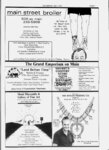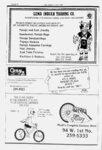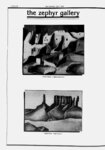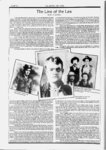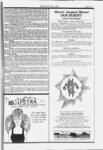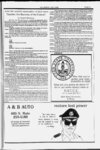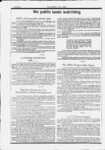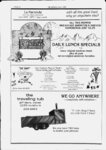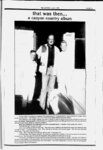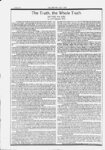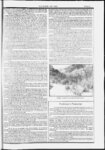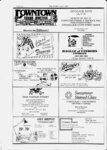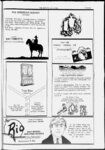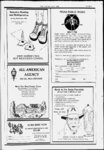| OCR Text |
Show THE ZEPHYR JULY 1990 PAGE 30 feedback the readers respond Dear Editor: Moab has the potential to grow exponentially In the next several years. Ive heard that change Is Inevitable and that theres no stopping the future course of events. In this letter I'd like to address a few of the changes that are taking place In our community due to Investors as well as those Individuals who come here to the Influence of some assist In city planning and beautification projects. My husband and I operate a gallery In a building that was recently purchased by a group of Investors. We send our rent check off every month to these phantom partners, only having met one member of the group. Weve seen them all standing several yards away from us In the hallway and weve heard them making suggestions to each other In reference to the building. However, neither my husband nor myself have yet had the experience of shaking hands with any one of them. I guess Its not the fact that they obviously dont care to meet us that Is disturbing, but rather the talk of their plans to move us all out of here and then turn the build ng Into a restaurant Well, thats the talk sometimes, anyway. Their plans have changed several times, but not once have I, nor my husband, heard any of this news, regarding our future here, directly from any one of our new landlords. Instead, weve heard It all through the notorious grapevine. I did approach one of the partners about their plans and got no straight answer. If one of the Investors does decide to put his own restaurant In this building, five tenants will be displaced, as well as eight Moab artists that we alone represent One of the Investors Is Tom Shellenberger, Moabs own economic development I coordinator. would think that he should be concerned about the existing businesses In Moab as well as bringing In new business from out of town. Our city hired David Olsen, an Individual from to be In charge of Moabs beautification. When I, talked to this new city planner on the phone he said, among other things, that he loved Durango and would love to have Moab "look like that This gentlemen Is under the sincere Impression that he knows what Is and Is not beautiful and our city hired him to tell us. My question Is, "Shouldn't each town have Its own personality and Identity? It's the Interesting mix of people and ideas that tfves a town Its personality, not Its number of trendy espresso and croissant shops. Its hard when you find a place that you love to Just sit by and watch these changes taking place. As I see It, excessive tourism Isn't our most urgent problem In Moab, but rather the Influence from the Investors who come here Just to make money rather than to become a part of our community. It seems while we focus on the tourism Issue, we are getting struck from behind by a far more lasting and unpleasant group of people the group of people that want to be Important and who want to be In control. out-of-to-wn out-of-to- wn out-of-to- wn out-of-to-wn, out-of-to- wn Best regards, Kathy Cooney, Moab, Utah Dear Zephyr: would like to respond to Raquel Shumways article In The Zephyr. June 1990. Economic considerations and geographical limitations are very real for all of us regardless of where we choose to live. However, despite local economics and use, federal lands belong to all Americans. Southern Utah locals have gotten a lot of use and some very "good deals from federal lands (l.e. subsidized grazing, roads, and other Improvements - paid for by all Americans), but local use does not equal local ownership. My husband and I return annually to southeastern Utah to visit friends (I lived there several years ago), backpack, and hike. We seek out places that are as unspoiled and as pristine as possible, and we try to avoid the areas that have been overgrazed, littered, eroded by ORVs, looted, chained, drilled, mined, or otherwise abused, or altered from their natural state. We consider ourselves environmentalists who support wise use of federal lands. Although we disagree with some uses of federal lands, we have never engaged In sabotage. Uke many tourists to southeastern Utah, we value Wilderness and protected federal lands highly, we use the land carefully and with great respect, and we spend money In your area each year. tomorrow, the states economic woes would not vanish with them. Shumway Is similarly mistaken on a related question: the Impact of tourism on the local economy. Admittedly, most residents of southern Utah do not benefit directly from the dollars tourists spend here. But money put Into circulation In a given area has what economists call a "multiplier effect Tourist dollars provide owners and employees of restaurants, motels, campgrounds, gas stations, grocery stores, gift shops, real estate businesses with more disposable Income, which Is agencies, and wilderness-relate- d typically used to purchase local goods and services. These purchases, In turn, enable other businesses to thrive, expanding their staffs, Inventories, levels of service, or physical plants. In this sense, Shumway and the rest of us do gain. Indirectly, from the money visitors bring to our community. Towns like Moab would face dire economic predicaments If this Influx of tourist dollars were to dry up. Compare Moab to, say, Escalante, and the beneficial economic Impact of tourism becomes obvious an3 clear. Nothing would bolster the economy of Garfield County more than the creation of an Escalante Canyons National Park. Contrary to what Shumway alleges, environmentalists are not trying to put "nature" ahead of "society. Rather, they are trying to preserve a relatively small part of the wilderness that still remains (less than 25 of the B.LM.'s Utah holdings, In the most comprehensive proposals) as an unspoiled habitat for other living beings and as a heritage for future generations to appreciate and enjoy. Moreover, they perceive that If people continue to Inflict damage on our earth at the current rate, global ecological catastrophe will ensue, In the wake of which humans will be forced to make drastic changes In their way of . life or else risk extinction. Environmentalists are thus trying qoJ to "save the earth at the expense of society, as Shumway would have It, but to save society by preserving the earth. Shumways entire article, like other statements wt forth by the organization she represents, Implies that environmentalists constitute a small, conspiratorial group with vast es power wielded for mysterious, maybe malicious ends. The truth Is that the large majority of Utahns, and of Americans generally, favor the designation of more wilderness areas and consider themselves proponents of conservation. Even the President of the United States calls himself an environmentalist By all (xll results, environmentalism ed Is the most popular and movement In this country. Shumway, however, conveniently overlooks all this. The characterizations and tone of her article are especially disturbing because they recall words once used by European fascists to brand Jews as a small but Influential clique bent on destroying the livelihood of the "little guy. Fifty years have passed, but the underlying psychology Is the same. When you are besieged by remote, obscure, Impersonal economic forces, find a scapegoat group to hold responsible. Of course, adopting this strategy does nothing to g, but It does permit one to vent repressed anger and Improve one's economic who make hostility against people easy targets. Most "environmentalists that Is to say, most Utahns and most Americans In fact, sympathize with the plight of ranchers, miners, and farmers. People recognize how difficult It Is to make a living today In these professions. But why not analyze the real economic causes of those difficulties (which generally concern tariffs and International trade) and offer genuine solutions that all can support and work to Implement, Instead of launching a witchhunt? Finally, we were unsure, In reading Shumways article, whether Its references to "19th century environmentalists represented an attempt at sarcasm and derision or simply another sad mistake. But we would submit that It Is Shumway who Is living In the 19th century, for she assumes a world In which wilderness Is abundant, resources are and social responsibility on the part of the land users Inexhaustible, nature Is behind-the-scen- widely-support- well-bein- self-repairi- Is ng, unnecessary. Sincerely, I gQggggggMgSS339SE53BBEESSS&EES333HSSBS ATTORNEYS TITLE Lynda Stocks, manager William L. Benge, licensed agent Locally Operated " Sincerely, Kate West, Saugertles, NY 4 To the Editor: Once again we feel compelled to respond to distortions, confusions, and errors contained In an article by Raquel Shumway. Shumway asserts that "19th century environmentalists (sic!) who favor the creation of more wilderness areas are somehow to blame for the poor economic health of southern Utah. She denies that tourism benefits most local people and threatens, In the guise of Issuing a warning, that If the local economy deteriorates further, violence and lawlessness may ensue. Finally, she charges that while environmentalists are attempting to "save the earth at the expense of society, they are "extremely egotistical to think for a moment that we can destroy everything," for the earth has "done well over the years without 19th century environmentalists to protect It Let us address these points In turn. First, It Is simply wrong to hold environmentalists, or any group, responsible for the depressed regional economy. The hunt for scapegoats prevents people from understanding that their problems are actually structural In character. That Is, they stem mainly from long-terImpersonal forces that no one controls, such as International shifts In supply and demand, the movement of new companies Into the marketplace, the Invention of more efficient technologies, the flight of capital from one Industry or region to another, and changes In public tastes, perceptions, and policies. For Instance, the mining Industry Is In a slump because uranium prices are low, not because of any restrictions placed by Congress or the EJP.A. on extracting the mineral. Likewise, cattle ranchers need new buyers for their beef, and would be wiser to lobby Washington to open up the highly-protecJapanese market than to waste time If troubles on all their environmentalists environmentalists. blaming packed up and left Utah m, ted Sandra and Lewis P. Hlnchman land title insurance title searches Real Estate Closings |






